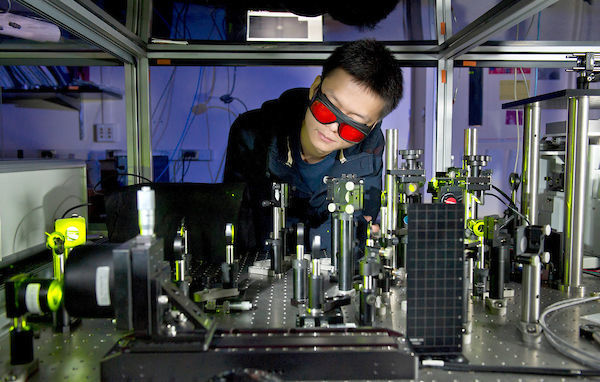
 A student researcher works in the lab of Greg Hartland, a 2019 NDnano Seed Grant recipient.
A student researcher works in the lab of Greg Hartland, a 2019 NDnano Seed Grant recipient.
Seven faculty members from the University of Notre Dame’s College of Engineering and College of Science have been awarded three grants through the NDnano Seed Grant Program. The program was developed to promote interdisciplinary research in nanoscience and technology to enhance Notre Dame’s ability to address important scientific questions and enable technical leaps.
“This is the second year we have been able to offer the Seed Grant Program and we are proud to be able to support new and exciting interdisciplinary research programs from NDnano faculty,” said Derek Lake, associate director of NDnano. “The selected projects could have broad implications – they highlight just a glimpse of what Notre Dame has to offer to the fields of nanoscience and nanotechnology.”
The 2019 Seed Grant Program recipients are:
-
Jennifer Schaefer, assistant professor in the Department of Chemical and Biomolecular Engineering, and Haifeng Gao, associate professor in the Department of Chemistry and Biochemistry, for their project titled, “Developing a new polymer platform for alkaline fuel cell membranes.” The goal of this research is to investigate a new polymer platform that could be used in developing a low-cost, high-performance anion exchange membrane for alkaline fuel cells.
- David Burghoff, assistant professor in the Department of Electrical Engineering, Badih Assaf, Freimann Assistant Professor in the Department of Physics, and Xinyu Liu, research associate professor in the Department of Physics, for their research called, “Topological materials for THz devices.” This research team aims to study the physics of topological insulators and use them to create high-speed terahertz detectors, which could improve systems that detect compact greenhouse gases or screen for explosives.
- Svetlana Neretina, associate professor in the Department of Aerospace and Mechanical Engineering, and Greg Hartland, professor in the Department of Chemistry and Biochemistry, for their project called, “Harvesting hot electrons for plasmonic photochemistry and photovoltaics.” The aim of this research is to discover how to effectively focus light energy into nanoscale volumes and then utilize the resulting short-lived hot electrons before their energy is transformed into heat.
The Center for Nano Science and Technology (NDnano) at the University of Notre Dame promotes collaborative research in science and engineering to address unsolved scientific and technical questions with an aim to promote the greater good. NDnano is where Notre Dame faculty, researchers, and students meet to broaden understanding, discuss multidisciplinary research opportunities, and shape future research directions. To learn more about NDnano, please visit nano.nd.edu.
Contact:
Heidi Deethardt / Center Coordinator
NDnano / University of Notre Dame
deethardt.1@nd.edu / 574.631.0279
About Notre Dame Research:
The University of Notre Dame is a private research and teaching university inspired by its Catholic mission. Located in South Bend, Indiana, its researchers are advancing human understanding through research, scholarship, education, and creative endeavor in order to be a repository for knowledge and a powerful means for doing good in the world. For more information, please see research.nd.edu or @UNDResearch.
Originally published by at nano.nd.edu on August 07, 2019.